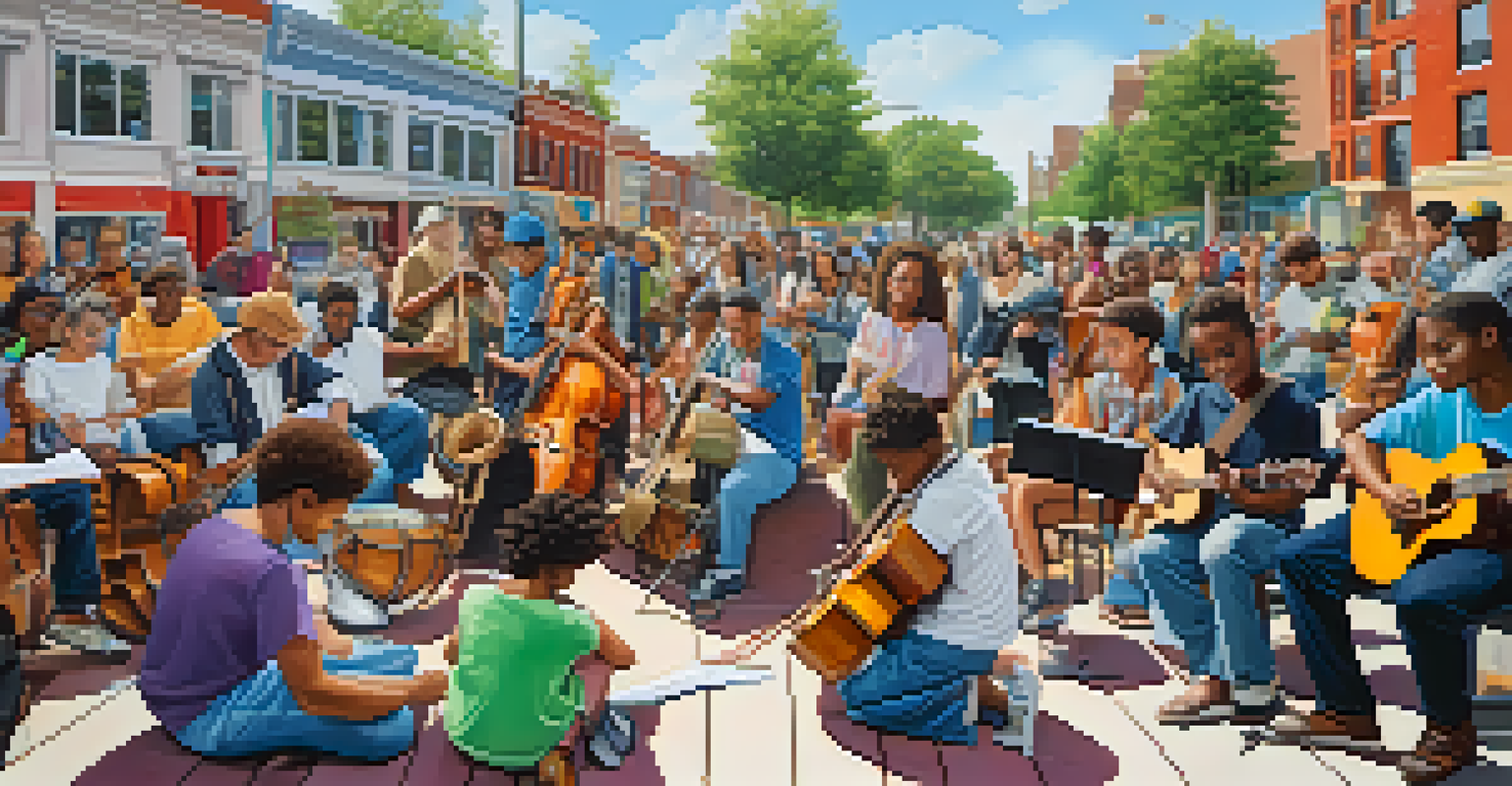Music and Environmental Awareness in Urban Settings

The Role of Music in Shaping Urban Culture
Music has always been a vital part of urban culture, serving as a reflection of the community's identity and values. As cities grow and evolve, so does the music that resonates within them, often highlighting social issues and environmental concerns. From street performances to music festivals, these gatherings create vibrant spaces that foster a sense of belonging and awareness among residents.
Music can change the world because it can change people.
Urban music genres, such as hip-hop and reggae, often incorporate themes related to the environment, encouraging listeners to think about their surroundings. For example, lyrics may address pollution, wildlife preservation, or the importance of green spaces. This kind of engagement not only entertains but also educates communities about pressing environmental issues they face daily.
Moreover, the fusion of music and activism has led to movements that use sound as a tool for change. Artists and musicians can amplify their messages, creating a platform for dialogue about sustainability and environmental responsibility in urban settings.
Music Festivals as Platforms for Environmental Education
Music festivals are more than just a collection of performances; they can serve as powerful platforms for promoting environmental awareness. Many festivals incorporate eco-friendly practices, such as recycling programs and the use of sustainable materials, setting a precedent for attendees. This not only enhances the festival experience but also teaches festival-goers about the importance of caring for their environment.

Additionally, many festivals invite environmental organizations to set up booths, providing information and resources on how to live sustainably. These organizations often conduct workshops and discussions, allowing attendees to engage directly with experts. By integrating education into entertainment, festivals can inspire participants to take actionable steps toward sustainability.
Music Fosters Urban Environmentalism
Music serves as a powerful tool to raise awareness about environmental issues within urban communities.
For instance, festivals like Coachella and Glastonbury have committed to reducing their carbon footprints, demonstrating that even large-scale events can prioritize the planet. This creates a ripple effect, encouraging fans to adopt eco-friendly practices in their own lives.
Community Music Projects for Environmental Advocacy
Community music projects play a vital role in raising environmental awareness at the grassroots level. These initiatives often bring together local artists and residents to create songs or performances that address environmental issues specific to their neighborhoods. This collaborative approach not only fosters creativity but also builds a strong sense of community ownership over local environmental challenges.
The power of music is undeniable; it can inspire, mobilize, and create change in ways that words alone cannot.
For example, initiatives like 'Song for the Earth' encourage participants to write and perform songs that reflect their concerns about local ecosystems. This not only raises awareness but also allows individuals to express their emotions and thoughts creatively. When community members see their concerns reflected in music, they are more likely to engage with and advocate for solutions.
These projects can also lead to larger movements, connecting communities across urban areas. By sharing their music online or during local events, participants can inspire others to join the cause, amplifying the message of environmental stewardship far beyond their immediate surroundings.
The Impact of Music on Urban Green Spaces
Urban green spaces, such as parks and gardens, benefit both from music and the community engagement it fosters. Live music events in these areas can draw people in, encouraging them to appreciate and interact with their environment. This connection can lead to increased advocacy for the preservation and enhancement of these vital spaces.
Moreover, music can contribute to the ambiance of urban green areas, making them more inviting for residents and visitors alike. Soundscapes that include music can enhance the experience of being outdoors, promoting mental well-being and social interaction. When people feel good in a space, they're more likely to spend time there and support its upkeep.
Festivals Promote Eco-Friendly Practices
Music festivals act as platforms for environmental education, encouraging attendees to adopt sustainable behaviors.
For instance, events like 'Music in the Park' not only entertain but also engage attendees in conversations about the importance of maintaining green spaces. These gatherings can inspire action, leading to community-driven initiatives aimed at improving and protecting urban environments.
Musical Collaborations with Environmental Organizations
Collaborations between musicians and environmental organizations can yield powerful results in raising awareness. Artists often leverage their platforms to promote eco-centric initiatives, creating songs or campaigns that resonate with their audiences. This partnership can amplify messages about climate change, pollution, and biodiversity loss.
For example, campaigns like 'Music for the Planet' feature artists who donate a portion of their proceeds to environmental causes. By aligning their brand with sustainability, musicians not only contribute financially but also increase visibility for these pressing issues. Fans are more likely to support causes when their favorite artists advocate for them.
These collaborations can also lead to events that combine music and environmental action, such as clean-up drives or tree-planting days, where attendees can enjoy live performances while contributing to a cause. This creates a unique environment where music and advocacy intertwine, fostering a sense of community and shared responsibility.
Using Music to Inspire Youth Action on Environmental Issues
Engaging youth in environmental advocacy through music can yield remarkable results. Young people are often at the forefront of social change, and music can serve as a motivating force that inspires them to take action. By incorporating environmental themes into popular music, artists can influence their young fans to care about sustainability.
Programs that combine music education with environmental studies can be particularly effective. For example, school initiatives that encourage students to write and perform songs about environmental challenges can create a strong sense of agency. When students see their voices reflected in music, they feel empowered to advocate for change in their own communities.
Youth Engagement Through Music
Involving young people in music-focused environmental advocacy can inspire them to take meaningful action for sustainability.
Furthermore, youth-led music events focused on environmental issues can attract attention and mobilize peers. These events not only provide a platform for young artists but also educate attendees about sustainability, creating a generation that is more aware and active in addressing environmental challenges.
The Future of Music and Environmental Awareness
As we look to the future, the intersection of music and environmental awareness is likely to grow even stronger. With the rise of digital platforms, musicians have unprecedented access to audiences worldwide, allowing them to share messages about sustainability like never before. This evolution means more opportunities for artists to collaborate with environmental organizations and reach a broader audience.
Additionally, technology is making it easier to incorporate eco-friendly practices into music production and events. Artists are increasingly adopting sustainable methods, from using renewable energy sources for performances to choosing eco-conscious merchandise. This trend not only sets an example for fans but also helps to mitigate the environmental impact of the music industry.

Ultimately, the fusion of music and environmental awareness can lead to meaningful change, inspiring communities to work together for a sustainable future. By harnessing the power of music, we can create a world where the rhythm of our lives aligns with the health of our planet.